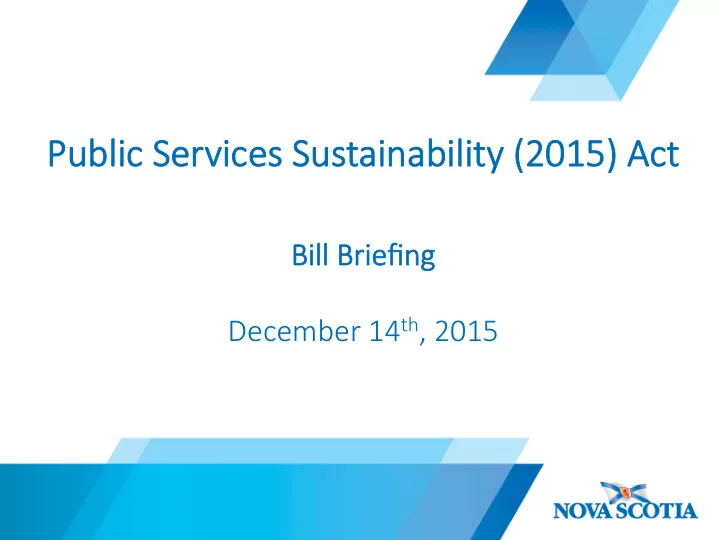

ainability ¡(2015) ¡Act ¡ ¡ Public Public ¡Ser ¡Servic vices ¡Sus es ¡Sustainability ¡(2015) ¡A ¡ ¡ Bill ¡Br Bi ¡Briefin efing ¡ ¡ ¡ December ¡14 th , ¡2015 ¡ ¡ ¡ ¡
Con Context • Nova Scotia is facing tough budget challenges. - The Province’s revenue shortfalls reflect a weaker-than expected economy and emphasize our need to control spending. • The single largest expense of government is compensation. - Government spends about $5.2 billion on compensation or 52 per cent of all of government’s total spending. • Government has a responsibility to set fiscal policy that ensures sustainability of programs and services. • This Bill provides certainty that the Province will be able to stay within its fiscal plan and protect the sustainability of public services. 2
Obje jecFves • To meaningfully engage public sector employees through their unions in a collective bargaining process where: • Efficiency, effectiveness and innovation are promoted • Some of the benefits are shared with employees. • To protect and preserve public services by negotiating collective agreements that are affordable to the taxpayers of the province. • To operate in conformity with the Finance Act, the principles of responsible fiscal management, and the four-year Fiscal Plan. ¡ ¡ ¡ ¡ ¡ ¡ ¡ ¡ ¡ ¡ ¡ ¡ ¡ ¡ ¡ ¡ ¡ ¡ ¡ ¡ ¡ ¡ ¡ ¡ ¡ ¡ ¡ ¡ ¡ ¡ ¡3 ¡
St Steps ¡ s ¡Tak aken ¡ n ¡to ¡ ¡Da Date • Meeting with union leaders August 18 th • Discussed Government’s commitment to meaningful collective bargaining and to protecting the Fiscal Plan. • Introduced Public Service Sustainability Mandate - Directed employers to negotiate five year agreements within fixed fiscal enveloped, with flexibility to apply portions of savings achieved through innovation to compensation plans • Asked union leaders to engage in meaningful collective bargaining • Follow-up meeting November 5 th • Discussed progress at bargaining tables • Invited feedback on bargaining process improvements in support of serving the public and sustainable public services • Negotiations underway • Four tentative agreements reached: one ratified; two pending ratification (recommended by bargaining agents); one voted down 4
Public Public ¡Ser ¡Servic vices ¡Sus es ¡Sustainability ¡A ainability ¡Act t Key ¡ ¡Eleme ments 5
Ap ApplicaFon on • Applies to all public sector employers and employees – unionized and non-unionized - Definition of public sector employee found in section 3(n) • Exception – those bargaining units with renewed agreements prior to proclamation - Does not apply to medical residents – they have concluded a new collective agreement • Does not apply to provincial court judges or family court judges - All provinces are required to set compensation for judges through an independent commission process, for constitutional reasons. 6
Comp mpensaFon ¡ ¡Fr Frame mework • Puts a framework in place regarding the extent of new money public sector employers can offer for wages • Same compensation framework as reached in tentative agreements with NSGEU, Residents, and Crown Attorneys • Puts statutory limit on public sector employers for increases to compensation in excess of the framework: 3% over 4 years (sections 13 and 14) • Additional increases may be allocated, if approved, through cost savings or cost avoidance — “shared gains” • Consistent with the Public Service Sustainability Mandate announced by the Minister of Finance and Treasury Board in August • Annual increments will continue for eligible employees 7
Ar Arbitrator ors • Right to arbitration is preserved for public sector employees • Legislation limits arbitrators from making awards that exceed the framework • Any award that does exceed the framework is of no force or effect • Public sector employers are not bound to implement any award of an arbitrator that provides for an increase in excess of the framework 8
Se Servic vice ¡ ¡Awar ard d • Special payment made to public sector employees upon retirement or resignation, based on years of public service. • Freezes the award, retroactive to April 1, 2015 - All public sector employees eligible for the amount they have accumulated up to April 1, 2015 (where applicable) • Applies the same provisions as exists for non- unionized public service employees: - Existing entitlements will be paid out upon retirement, based on salary as of April 1, 2015 - Future accrual will stop - New employees (after April 1, 2015) will not be eligible • Service Award liability will cease to accrue – in the last fiscal year liability exceeded $50 million 9
ians ¡ Ph Physic sicians • Physicians are generally not employees, but deliver insured health services through several fee and compensation models • These compensation models are complex and part of public health care policy decisions. • Legislation will temporarily suspend arbitration for physicians for 4 years - April 1, 2015 – March 31, 2019 • Government works with physicians on a collaborative basis to appropriately determine these models. • Arbitration has not been used in the past. • Negotiations with physicians continue. 10
Admi ministraFon • The Bill establishes a Public Service Sustainability Board • Board will be responsible for dealing with questions that arise about interpretation or application of the Act, when proclaimed • Members will be cross-appointed from the Labour Board • No full-time positions • Powers of the board to be determined by regulation 11
Ne Next ¡S ¡Step eps • The legislation will come into force upon proclamation. • Negotiations continue. - Act does not prevent negotiation and does not impose agreements. - Act does not take away provisions of collective agreements bargained in earlier years. - Negotiation continue. - Public sector employers remain ready, willing, and able to engage in meaningful collective bargaining • The Bill gives employers room to negotiate. • Encourages public sector employers and unions to work together to find savings - a portion of which could then be applied to further wage increases. 12
Thank you.
Recommend
More recommend